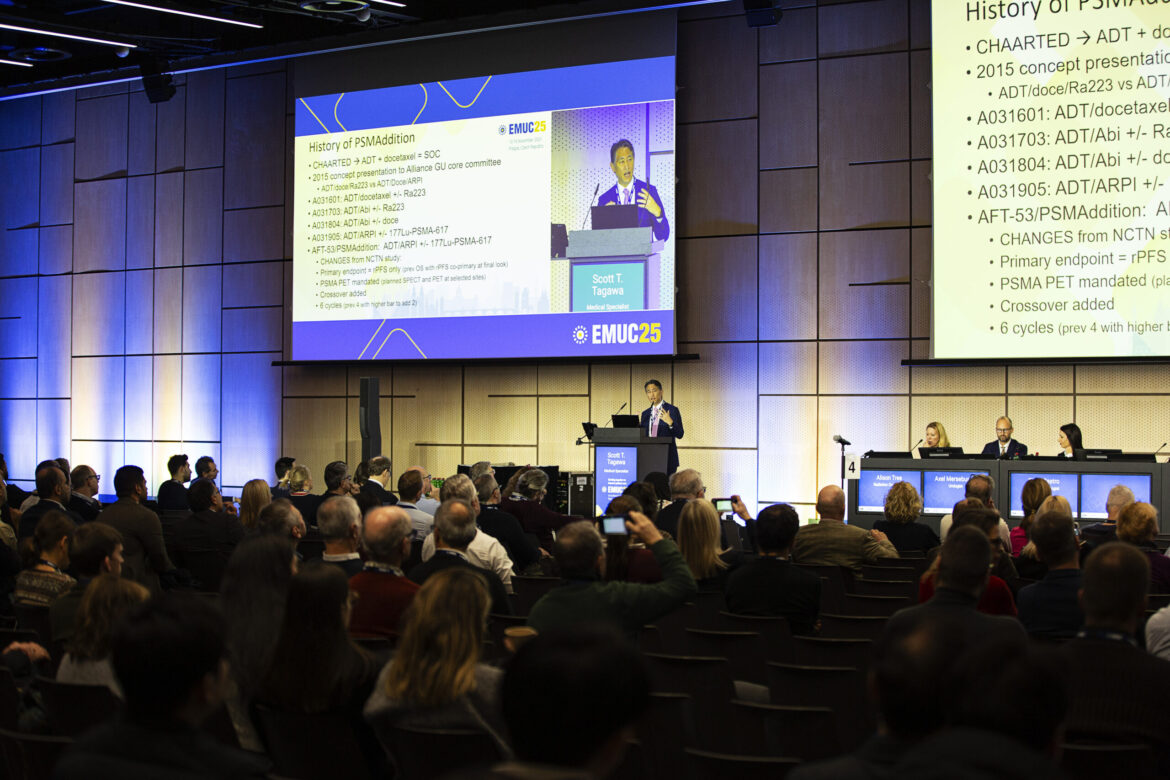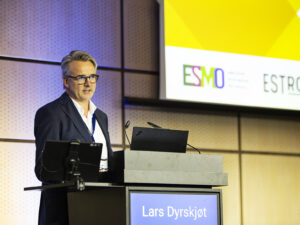In an auditorium packed to capacity, Dr. Elena Castro (ES), Prof. Axel Merseburger (DE), and Dr. Alison Tree (GB), chaired the ‘Game-changing’ session on day three of EMUC25, which offered a concise wrap-up of an exceptional year in oncology research, particularly for prostate cancer patients. This report summarises the presentations on PSMAddition, AMPLITUDE, CAPItello-281, and EMBARK results.
PSMAddition
Medical oncologist Prof. Scott Tagawa (US) presented the interim analysis of PSMAddition, a phase III trial of 177Lu-PSMA-617 combined with androgen deprivation therapy (ADT) plus an androgen receptor pathway inhibitor (ARPI) in patients with PSMA-positive metastatic hormone-sensitive prostate cancer (mHSPC).
Dr. Tagawa: “The addition of 177Lu-PSMA-617 with ADT and ARPI led to a statistically significant improvement in radiographic progression-free survival (rPFS) in patients with PSMA-positive mHSPC, compared to ADT + ARPI. This benefit was consistent across subgroups. There was a positive trend in overall survival (OS), with follow-up for mature data ongoing. The results of the PSA response, PFS, mCRPC, and symptomatic skeletal events (SSE) favoured the 177Lu-PSMA-617 combination arm.”
In regard to safety, Dr. Tagawa said that findings where consistent with the known profile of 177Lu-PSMA-617, with no unexpected concerns about the combination with ADT + ARPI. “Adverse events were more frequent in the 177Lu-PSMA-617 combination arm, most commonly dry mouth, fatigue, and nausea. There were no clinically significant differences in time worsening in health-related quality of life.”
He concluded that the PSMAddition trial findings indicate that combining 177Lu-PSMA-617 with ADT and ARPI provides a clinically meaningful benefit in patients with PSMA-positive mHSPC.
AMPLITUDE
“This trial is a good example of molecular precision medicine.” Began Dr. Gerhardt Attard (GB) in his presentation on the phase 3 AMPLITUDE trial results: niraparib + abiraterone acetate + prednisone for metastatic castration-sensitive prostate cancer (mCSPC) patients with alterations in homologous recombination repair genes.
Dr. Attard: “The AMPLITUDE trial met its primary endpoint of improved rPFS, with the likely greatest benefit of the combination treatment in patients with BRCA alterations (HR: 0.52). Improvements in rPFS were supported by a statistically significant delay in time to symptomatic progression and a trend toward improved overall survival. There was less than 5% increase in patients discontinuing treatment due to toxicity compared to the placebo.”
He also noted that treatment intensification requires careful patient selection due to the associated increase in toxicity.
He concluded that the AMPLITUDE results support early genomic testing, and niraparib + abiraterone acetate + prednisone as a new treatment option for patients with mHSPC and HRR gene alterations.
CAPItello-281
Dr. Gerhardt Attard (GB) also presented the phase III study of capivasertib + abiraterone versus placebo + abiraterone in patients with PTEN-deficient de novo mHSPC, an important advancement given that these patients typically have a poor prognosis and limited benefit from the current standard-of-care therapy.
From the results he presented, the CAPItello-281 trial met its primary objective, showing statistically significant PFS benefit with capivasertib + abiraterone versus placebo + abiraterone. “The median rPFS of capivasertib + abiraterone was 33.2 months versus the placebo + abiraterone of 25.7 months (HR: 0.81, 95% CI: 0.66-0.98; p=0.034). Consistent benefits were also observed in secondary endpoints and clinically relevant pre-defined subgroups, but overall data were immature, and further follow-up is planned”.
Dr. Attard concluded with, “Capivasertib + abiraterone represents a potential first-in-class targeted treatment for patients with PTEN-deficient mHSPC.”
EMBARK
Dr. Murilo De Almeida Luz (US) presented the overall survival (OS) results from EMBARK, a randomised phase III trial of enzalutamide (enza) or placebo + leuprolide acetate and enzalutamide monotherapy in high-risk biochemically recurrent prostate cancer (HRBCR PCa). This trial began in 2014.
According to the trial results Dr. De Almeida Luz presented, the combination of enza + leuprolide reduced the risk of death by more than 40% versus leuprolide alone in patients with HRBCR PCa, and there was no evidence of metastasis on conventional imaging.
“Enza monotherapy led to numerically lower risk of death versus leuprolide alone, although the difference did not reach statistical significance. The trial results show that significant improvements in time to first use of the new antineoplastic therapy, time to symptomatic skeletal events, and PFS further highlight the benefit of both combining enza and monotherapy. The results show no new safety signals in the long-term safety analysis.”
—–
You can watch the full presentations, including the other ‘game-changing’ trials presented (CREST, ARASAFE, PACE B+C, and POTOMAC) via webcast recordings at the EMUC25 Resource Centre.





